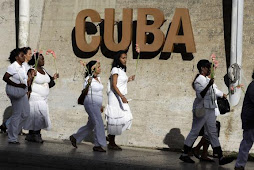Posted on Saturday, 04.12.14
Cuba — where even human rights are subversive
BY MIRTA OJITO
MAO35@COLUMBIA.EDU
Every country has its own narrative, a product of its history and
mythology. Narratives are important because they are, essentially, the
stories we tell ourselves. And stories are the foundation of humanity.
It's how we establish connections and how we remain connected.
Stories sell everything, from shoes (think Zappos) to pizza (think of
all those menus with family histories) to revolutions (think of the 20th
Century).
Political leaders know this and so do dictators, of course, which is why
the Cuban revolution was so successful and why it's lasted so long. It
was a good story. Astonishingly, for many, it still is.
I first rebelled against "the story" of the revolution at 10, when, at
the end of the school year, my teachers gave me a large book with
gruesome picture of the bloodied and tortured bodies of young men who
had died in the struggle against Fulgencio Batista.
The idea was that I would feel humbled and grateful for their sacrifice.
But too many martyrs already weighed on my then narrow shoulders, from
José Martí to Che Guevara. I closed the book and hid it on top of the
tallest shelf I could find. When I left Cuba six years later, I'm pretty
sure the book was still there.
One of the first things the Cuban government did when it came to power
in 1959 was to close the newspapers and eradicate press freedoms. The
narrative was one and it was tightly controlled. The only mythology
allowed was the one fed to the masses by the regime.
Shrewdly, it neatly tied together rebellious native Cubans and Martí's
poetry, with the mambises who fought against the Spaniards, and a dozen
bearded men who came down the Sierra Maestra Mountains to become the
leaders of the "first free territory of America." (In a sign of the
endurance of that particular mythology, Amazon sells posters with this
phrase for $6.99 plus shipping).
And that's pretty much how the country remained until the emergence of
independent journalists in the 1990s and, later, with the advent of the
Internet, a handful – now dozens – of courageous men and women who share
a different story.
Powerful and personal, intimate yet universal, their stories pierced the
thick mantle of censorship that encapsulates the island like a hard
shell, and the world began to see a different narrative — a more
literary, civil, measured and inspired one. A narrative that reaches
back to our oldest and richest mythology: Cubans as learned and
tolerant. Cuba as an inclusive island.
It's been nearly impossible to disseminate that message among Cubans
because access to the Internet on the island is restricted and
expensive, the second most expensive in the world, after Eritrea.
Now comes the news, revealed by AP last week, that the United States
Agency for International Development created and financed a social media
site, similar to Twitter, called ZunZuneo. The site, which closed in
2012, was either a way to promote communication in Cuba or a covert
attempt to weaken, or even overthrow, the Castro regime.
Because I don't believe the Obama administration has the desire or
inclination to overthrow any government, I'm going with the agency's
version, as revealed by Rajiv Shah, USAID's administrator, during a
congressional hearing last Tuesday.
"These programs are part of our mission to promote open communications,"
he said.
While the idea may have been to help the democratic forces on the
island, Orlando Luis Pardo Lazo, a writer and blogger who is now in the
U.S., told me no one he associated with in Cuba's blogosphere even knew
of ZunZuneo. Yet, he said he has no doubt the program, though now
defunct, will be used against those who promote democracy there.
"To support human rights is not subversive," he said. "The problem is
that in Cuba human rights are subversive."
Even our languages — both English and Spanish — certainly do accommodate
this need for story. It is time to "turn the page" when we need to move
on, when " el cuento," the story, changes on us. But you can't turn the
page when someone else is holding the book.
What is needed in Cuba, with the aid of the U.S. government or any other
country or international organism willing to help, is a way for its
people to connect with each other and create a new narrative for
themselves, sidestepping the stories they have been told for years by
the Cuban government, by the Americanos, and by the nostalgic left.
Only then will they be able to imagine the country they want. If they
can imagine it, they can build it. And that would be a much better story
to tell than the one we've been repeating for more than half a century.
Source: Cuba — where even human rights are subversive - Other Views -
MiamiHerald.com -
http://www.miamiherald.com/2014/04/12/4054280/cuba-where-even-human-rights-are.html
Subscribe to:
Post Comments (Atom)





No comments:
Post a Comment